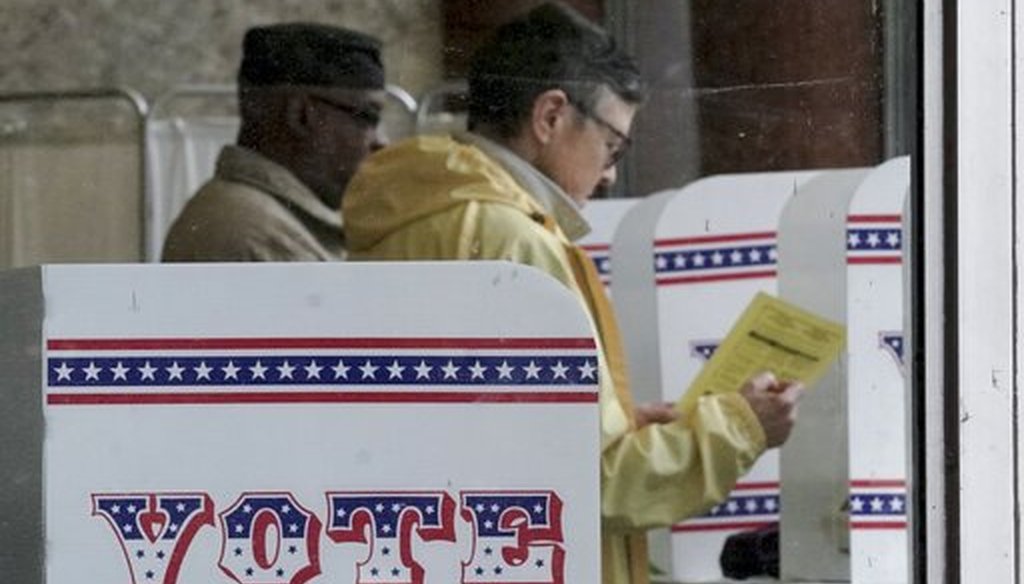UPDATES: On March 28, New York announced that it would be moving its primary back from April 28 to June 23. (Our chart has been updated.) On March 31, Kansas announced that its primary on May 2 would be held entirely by mail. On April 1, West Virginia said it was delaying its primary.
The coronavirus pandemic has wreaked havoc on the Democratic primary calendar.
As of March 25, no fewer than 11 jurisdictions have done what in normal times would be unthinkable — delay their primary. Another four states have decided to go with all-mail balloting, so that voters won’t be forced to risk infection by congregating at physical polling places.
These changes will obviously affect the remainder of the presidential nomination race between former Vice President Joe Biden and Sen. Bernie Sanders, I-Vt. A delegate-selection process that was supposed to be officially over by June 6 now will extend until at least June 23.
Election officials have been forced to scramble not just over voting dates but also over what types of voting methods are safe and effective in the midst of a pandemic. The uncertainty is affecting countless other races, including congressional seats, statewide posts and local offices.
Here’s what we know about the rest of the 2020 Democratic primary calendar, at least for now.
What changes have been made so far?
Here are the main changes that have been made to the primary calendar, in chronological order by the current date.
• Three states scheduled to vote on April 4 shifted to all-mail balloting. These are the Alaska primary, the Hawaii primary and the Wyoming caucus. Each state also shifted the dates ballots are due. (See chart below.)
• Ohio was supposed to have voted on March 17; it’s now voting in an April 28 all-mail primary.
• Puerto Rico shifted its March 29 primary to April 26.
• Kansas, which votes May 2, has shifted to all-mail balloting.
• Georgia shifted its March 24 primary to May 19.
• Six states have shifted their primaries to June 2. Indiana, had been scheduled to vote May 5. The other five — Connecticut, Delaware, Maryland, Pennsylvania, and Rhode Island — shifted their primaries from April 28.
• West Virginia shifted its May 12 primary to June 9.
• Louisiana shifted its April 4 primary to June 20.
• Kentucky and New York have shifted their primaries to June 23.
The following chart shows how the new primary calendar looks, state by state.
What are some of the earliest potential trouble spots?
States and territories representing about 58% of delegates have already cast their ballots. Here are the states with election dates coming up quickly that represent some of the remaining 42% of delegates:
• Wisconsin. The crucial November battleground state is slated to cast its primary ballots on April 7, and it’s planning to go ahead as scheduled.
Democratic Gov. Tony Evers is encouraging voters to cast ballots by mail where possible. Wisconsin has no-excuse absentee voting, so that should ease the load for in-person voting, and in some areas there will be curbside in-person voting, NPR reported. But the short timeline has forced state and local officials to scramble.
• Puerto Rico. Puerto Rico has moved its primary to April 26, but that may not be sustainable, depending on the course of the pandemic. (Puerto Rico does not vote in the general election, but along with other U.S. territories, it helps determine the Democratic nominee.)
• New York. New York is both a key primary state for Democrats, due to the size of its population and the strength of its Democratic leanings. It’s also the undisputed U.S. epicenter of the coronavirus outbreak as of late March.
On March 28, the state decided to hold its presidential primary on the same day as the primary for state legislative and congressional seats, which is June 23.
The voting rules in New York are much more rigid than in many other states: Voting by mail is allowed only with a valid excuse, and there is no in-person early voting. This puts enormous pressure on physical polling places on Election Day, a reality that’s in stark conflict with what health officials are recommending.
Those rules could be changed by legislation, and a measure to shift to all-mail elections has been introduced.
• Kansas. The primary remains scheduled for May 2, but on March 31 it was announced that the primary would be entirely by mail. Kansas was already a no-excuse absentee ballot state. (Guam also votes on May 2.)
• Nebraska. Nebraska is planning to keep its May 12 primaries as scheduled, officials told CNBC.
How do the delays complicate the process?
Political analysts say it’s highly unlikely that Sanders will be able to win enough delegates in the remaining contests to defeat Biden for the nomination. Stil, Sanders has floated the idea of staying in the race at least through April 28, which would be the day of New York’s primary, unless it’s moved.
Josh Putnam, a political scientist specializing in the nomination process, told PolitiFact that the changes in the calendar are not a major threat to the validity of the race. The main concern, he said, revolves around the ability of state and local officials to assign individual people to the delegate spots that each candidate has won in primaries and caucuses.
In some states, delegates are chosen directly by voters on their ballots, but in many others, delegates are selected at Democratic Party meetings that are held variously on the local, congressional district, and statewide levels. If coronavirus forces continued stay-at-home orders, those meetings would have to be delayed or turned into remote gatherings.
"Logistics is the main problem now," Putnam said.
In the longer term, the Democrats will need to decide whether it’s feasible to hold their nominating convention in Milwaukee between July 13 and July 17. Officially, the event is on for now, but that may not be tenable if coronavirus concerns persist.











































